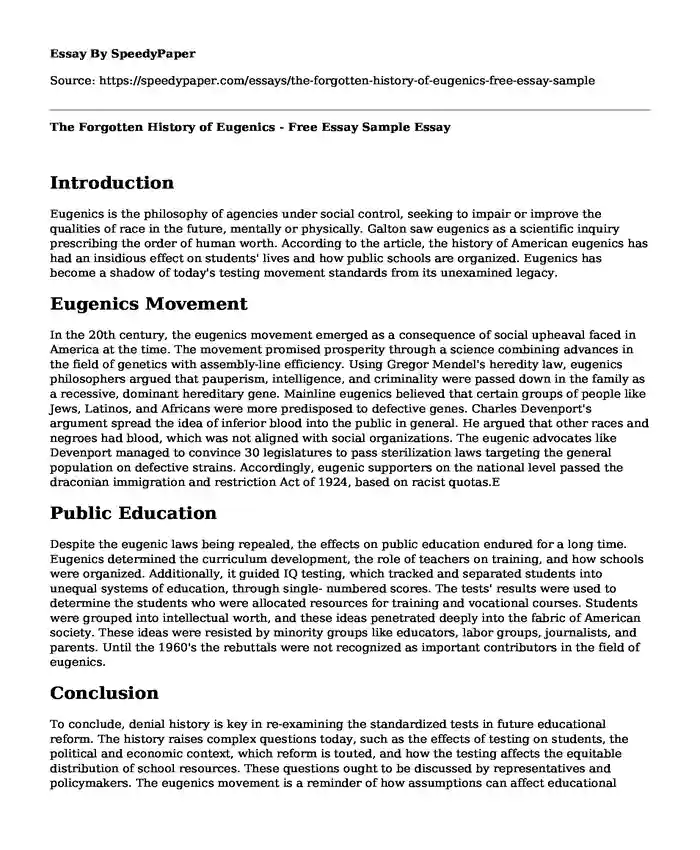
| Type of paper: | Essay |
| Categories: | Race History Education United States Science |
| Pages: | 2 |
| Wordcount: | 425 words |
Introduction
Eugenics is the philosophy of agencies under social control, seeking to impair or improve the qualities of race in the future, mentally or physically. Galton saw eugenics as a scientific inquiry prescribing the order of human worth. According to the article, the history of American eugenics has had an insidious effect on students' lives and how public schools are organized. Eugenics has become a shadow of today's testing movement standards from its unexamined legacy.
Eugenics Movement
In the 20th century, the eugenics movement emerged as a consequence of social upheaval faced in America at the time. The movement promised prosperity through a science combining advances in the field of genetics with assembly-line efficiency. Using Gregor Mendel's heredity law, eugenics philosophers argued that pauperism, intelligence, and criminality were passed down in the family as a recessive, dominant hereditary gene. Mainline eugenics believed that certain groups of people like Jews, Latinos, and Africans were more predisposed to defective genes. Charles Devenport's argument spread the idea of inferior blood into the public in general. He argued that other races and negroes had blood, which was not aligned with social organizations. The eugenic advocates like Devenport managed to convince 30 legislatures to pass sterilization laws targeting the general population on defective strains. Accordingly, eugenic supporters on the national level passed the draconian immigration and restriction Act of 1924, based on racist quotas.E
Public Education
Despite the eugenic laws being repealed, the effects on public education endured for a long time. Eugenics determined the curriculum development, the role of teachers on training, and how schools were organized. Additionally, it guided IQ testing, which tracked and separated students into unequal systems of education, through single- numbered scores. The tests' results were used to determine the students who were allocated resources for training and vocational courses. Students were grouped into intellectual worth, and these ideas penetrated deeply into the fabric of American society. These ideas were resisted by minority groups like educators, labor groups, journalists, and parents. Until the 1960's the rebuttals were not recognized as important contributors in the field of eugenics.
Conclusion
To conclude, denial history is key in re-examining the standardized tests in future educational reform. The history raises complex questions today, such as the effects of testing on students, the political and economic context, which reform is touted, and how the testing affects the equitable distribution of school resources. These questions ought to be discussed by representatives and policymakers. The eugenics movement is a reminder of how assumptions can affect educational reforms if not tested in real life.
Cite this page
The Forgotten History of Eugenics - Free Essay Sample. (2023, Nov 24). Retrieved from https://speedypaper.com/essays/the-forgotten-history-of-eugenics-free-essay-sample
Request Removal
If you are the original author of this essay and no longer wish to have it published on the SpeedyPaper website, please click below to request its removal:
- Biology Essay Example: Structure of Eukaryotic Cells
- Essay Sample Containing Jesse Jackson Speech Analysis
- What Is Social Power Essay Example
- Free Essay Example: Macro and Microlinguistics in Saudi Arabia
- Essay Sample on Experiences of Soldiers During WWII
- Paper Example on Assessing Data Quality
- Free Essay on Shaping Public Opinion: The Democratic Party's Role in Civil Rights Debates and Rallies
Popular categories




